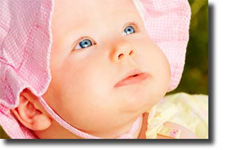Baby Hiccups

Some Interesting Facts About Baby Hiccups
New parents are often concerned about baby hiccups. They want to know what is causing them and if it is ok for their child to have them so regularly. The most important thing to remember about hiccups is that they are perfectly normal. A new mother may actually feel regular movements in the womb that take place every few minutes. These are baby hiccups and they can begin as early as the first trimester of pregnancy. While this is known, it is not know what causes the hiccups so early in the womb.
Once your baby is born he/she may experience hiccups at regular intervals. This is even more likely if your baby had baby hiccups in the womb and they may begin as soon as your baby is born. This happens because the baby’s diaphragm muscles will contract. This causes your baby to take quick, short breath. Some common causes of baby hiccups that have been discovered include eating or drinking to fast, laughing when they do not have any food in their stomach or simply being tired.
Many parents may notice that these generally occur when your baby is excited or shortly after he/she has just eaten a meal. Some babies will swallow too much air while they are eating and this can cause the baby hiccups. You may able to gently pat your baby on the back in order to help him/her belch because babies can not burp on their own. This is often the number one way to help stop hiccups. As a parent or childcare provider, you may also want to check the nipple that the baby is sucking out of in order to eat. If the nipple hole is the wrong size for the baby’s age, he/she may be getting too much air that way. Again, this can result in those irritating hiccups. Also, if you notice hiccups after every meal that your baby has you can try feeding the baby smaller portions more frequently. Keep in mind that babies with acid reflux may experience hiccups more frequently than other babies.
Try distracting your baby to help them keep their mind off of them until they have gone away. As previously mentioned, the important thing to keep in mind is that they are not going to hurt your baby in any way. Other possible solutions may be to give your baby a small sip of water or a natural remedy called grip water. You could also try to lay your baby on his/her tummy and rub his/her back. This could help get some of the air out of the tummy and stop the hiccups. You should never attempt to cure baby hiccups by using old folk remedies such as startling your baby or pressing on their eyeballs. These may be remedies in other cultures but they are dangerous and they are not appropriate for babies or infants.
As your baby gets older the bouts of baby hiccups will become less frequent but your baby may actually begin to get frustrated when they get hiccups the older he/she gets. At times, feeding your baby may help get rid of these. However, for some babies, the hiccups may cause them to become so irritated that it may be difficult for them to eat. If that is the case, you should consult your baby’s physician so that your child does not become malnourished and they continue to get enough to eat. If your child continues to have uncontrollable baby hiccups after the age of one or they are occurring frequently you may want to talk to your baby’s doctor to ensure that nothing is wrong.